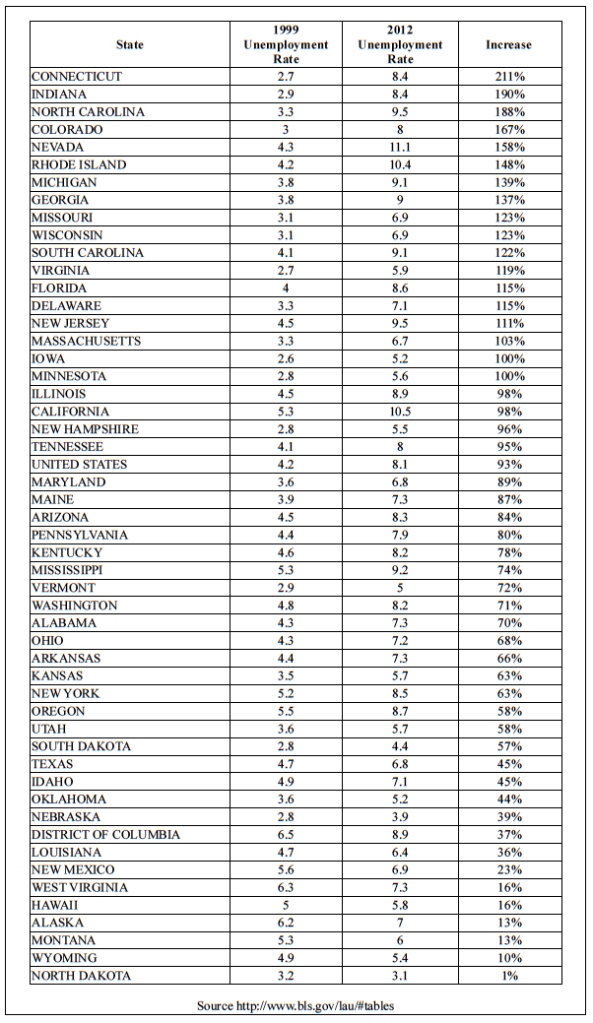In 1999 the US Census Bureau estimated the US population as a whopping 274,076,000. In 2012, just thirteen years later, the population was officially estimated to have risen to 315,104,214. This was an increase of 41,028,214 people, enough to fill Wrigley Field more than 997 times, or enough to fill 820,564 Greyhound buses. It represents a population increase of 15%, meaning that by 2012 America needed to produce and consume 15% more of everything just to have maintained the 1999 status quo over those thirteen years. Ideally then, between 1999 and 2012 American companies would have become 15% more successful, American people would have enjoyed 15% more out of life, and 15% more jobs would be created.
Unfortunately, the reality is that during those years thousands of businesses failed, “real” incomes dropped, and states reported increases as high as 211% in unemployment rates. Politicians and corporate America were all in agreement though: the answer to unemployment was easy: every American had to do the patriotic thing and buy more stuff. If we would just be super-voracious consumers then companies would have more money and could create more jobs, then people would have more income and pay more taxes, then government would have more money and could provide more services, then financial pixies would sprinkle magical dust and…
Unfortunately, evidence has been mounting for years that overconsumption is the root of our problem, not the answer to it. What if we were to try something different? Here are five ways to change your world:
1. Limit consumption
Advertisers have very successfully lead us believe that we can buy happiness, admiration, and yes, even love. Buy this liquor/perfume/underwear and you’ll be irresistible to the opposite sex! Buy this truck and you’ll be macho! Buy these shoes and you’ll be an athlete! Buy this food and you’ll be full of energy! Buy this prescription and your horrible symptoms will be replaced by these awesome side-effects! Instead, let’s turn off the advertising, stop listening to all those companies begging for our money, and instead recognize that we’re already happy, admired, and loved. We don’t need to buy their junk to know that.
2. Buy with cash, not credit
When you do buy things, be sure to buy within your means. For expensive items that will mean saving up. That’s right, no more instant gratification. And while you save up, that “must buy must buy must buy’ moment will have passed. You’ll often find that you don’t need that expensive item after all.
3. Buy used, not new
This has a big positive impact on our carbon footprint. And with built-in obsolescence a reality with so many products, finding a used item in working order can be a really good find – an item that may last for years.
4. Unemployment means you expect someone else to value your skills
Why be miserable waiting for someone else to employ you when you could employ yourself? If you find that the skills you used with a previous corporate employer are of little use to you as an individual, consider how you might create an income from one of your interests or hobbies. It doesn’t have to be a lot – it just has to be a start.
5. Stop buying food and grow your own instead
This is one of the easiest ways to have a big impact on your wallet, your health, your environment, and to help reverse some of the problems of our modern food system. You don’t need a house with a garden; huge amounts of food can be grown in containers on apartment balconies, or indoors with grow-lights.
